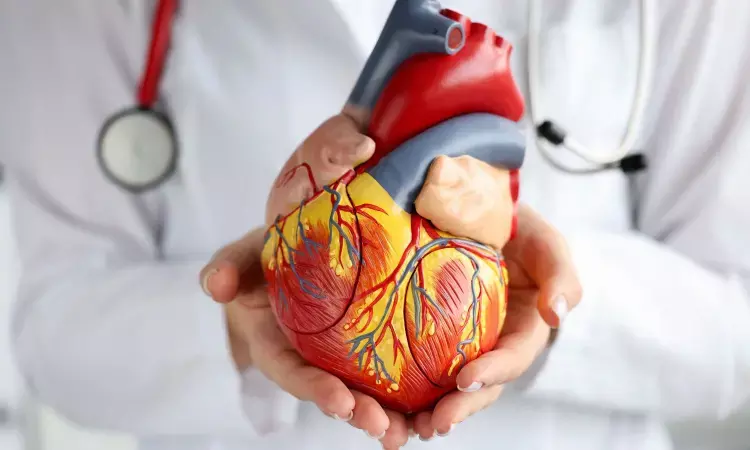- Home
- Medical news & Guidelines
- Anesthesiology
- Cardiology and CTVS
- Critical Care
- Dentistry
- Dermatology
- Diabetes and Endocrinology
- ENT
- Gastroenterology
- Medicine
- Nephrology
- Neurology
- Obstretics-Gynaecology
- Oncology
- Ophthalmology
- Orthopaedics
- Pediatrics-Neonatology
- Psychiatry
- Pulmonology
- Radiology
- Surgery
- Urology
- Laboratory Medicine
- Diet
- Nursing
- Paramedical
- Physiotherapy
- Health news
- Fact Check
- Bone Health Fact Check
- Brain Health Fact Check
- Cancer Related Fact Check
- Child Care Fact Check
- Dental and oral health fact check
- Diabetes and metabolic health fact check
- Diet and Nutrition Fact Check
- Eye and ENT Care Fact Check
- Fitness fact check
- Gut health fact check
- Heart health fact check
- Kidney health fact check
- Medical education fact check
- Men's health fact check
- Respiratory fact check
- Skin and hair care fact check
- Vaccine and Immunization fact check
- Women's health fact check
- AYUSH
- State News
- Andaman and Nicobar Islands
- Andhra Pradesh
- Arunachal Pradesh
- Assam
- Bihar
- Chandigarh
- Chattisgarh
- Dadra and Nagar Haveli
- Daman and Diu
- Delhi
- Goa
- Gujarat
- Haryana
- Himachal Pradesh
- Jammu & Kashmir
- Jharkhand
- Karnataka
- Kerala
- Ladakh
- Lakshadweep
- Madhya Pradesh
- Maharashtra
- Manipur
- Meghalaya
- Mizoram
- Nagaland
- Odisha
- Puducherry
- Punjab
- Rajasthan
- Sikkim
- Tamil Nadu
- Telangana
- Tripura
- Uttar Pradesh
- Uttrakhand
- West Bengal
- Medical Education
- Industry
Flecainide useful for achieving and maintaining Sinus rhythm among young patients with rheumatic AF

Rheumatic heart disease is the common etiology in patients with Atrial fibrillation (AF). These patients have a higher rate of thromboembolic complications. Many patients with rheumatic AF are young. There are long-term adverse effects secondary to Amiodarone, so exploring other rhythm control options for these patients is imperative.
In a recent study published in the Indian Heart Journal, researchers demonstrated the safety and effectiveness of Oral Flecainide in post-mitral valve replacement (MVR) rheumatic AF patients; maintenance of SR was achieved in 76% of initial converters and 64% of the overall population, with better LA strain values.
Despite successful MVR, many patients remain in AF. Flecainide could be useful in these patients but not used due to underlying structural heart disease. In this study, researchers assessed the safety and efficacy of oral Flecainide in rheumatic AF following MVR for conversion and maintenance of SR in 25 patients aged 34.4 years with a mean AF duration of 3.6 years. Non-converters underwent DC cardioversion at 24 h and four weeks. Patients received Flecainide and bb/diltiazem at discharge.
Key results of the study are:
- A single oral dose of Flecainide achieved SR in 6 patients (24%). Nineteen patients achieved SR after DCC; at 24 h, 21 patients (84%) were in SR.
- With the mean flecainide dose, 16 patients had successful maintenance of SR at six months.
- Researchers reported no significant changes in PR interval, QRS duration or QTc were noted.
- Flecainide was well tolerated.
- At six months, Patients in SR had better functional status, QOL scores and higher LA strain.
- Baseline LA diameter ≤ 61 mm predicted SR at six months (sensitivity/specificity 93.7% and 85.71%), while the values for AF duration ≤ 4 years and LA strain > 21% for predicting SR were 87.5/71.43% and 100/85.71% respectively.
They said that Flecainide may be an attractive modality for achieving and maintaining SR for rheumatic AF.
The study has a small number of patients. More studies need to be carried out with longer follow-ups, they said. The researchers acknowledged the lack of comparison with other drugs as another limitation.
Reference:
Tripathi, U., Kapoor, A., Agarwal, S. K., Tewari, P., Pande, S., Chandra, B., Sahu, A. K., Khanna, R., Kumar, S., Garg, N., & Tewari, S. (2023). Flecainide for conversion and maintenance of sinus rhythm after mitral valve replacement in rheumatic atrial fibrillation. Indian Heart Journal. https://doi.org/10.1016/j.ihj.2023.07.001
BDS, MDS in Periodontics and Implantology
Dr. Aditi Yadav is a BDS, MDS in Periodontics and Implantology. She has a clinical experience of 5 years as a laser dental surgeon. She also has a Diploma in clinical research and pharmacovigilance and is a Certified data scientist. She is currently working as a content developer in e-health services. Dr. Yadav has a keen interest in Medical Journalism and is actively involved in Medical Research writing.
Dr Kamal Kant Kohli-MBBS, DTCD- a chest specialist with more than 30 years of practice and a flair for writing clinical articles, Dr Kamal Kant Kohli joined Medical Dialogues as a Chief Editor of Medical News. Besides writing articles, as an editor, he proofreads and verifies all the medical content published on Medical Dialogues including those coming from journals, studies,medical conferences,guidelines etc. Email: drkohli@medicaldialogues.in. Contact no. 011-43720751


